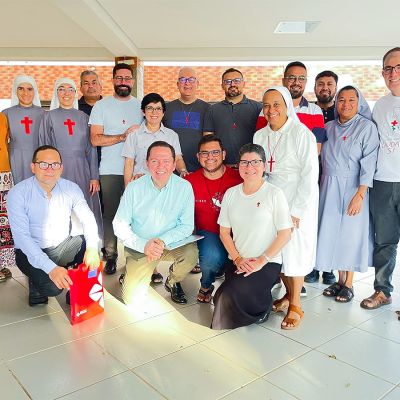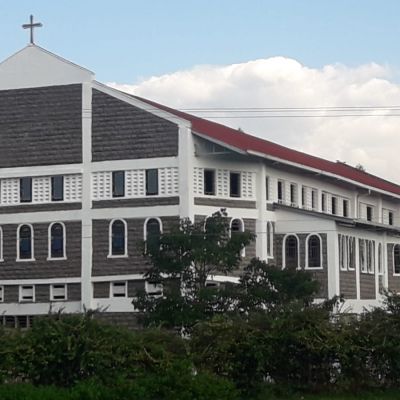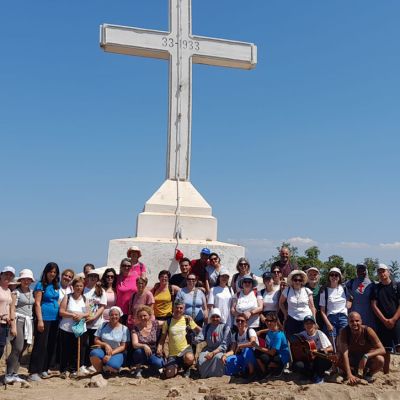The Martyrs of Charity (25 May – the Birth of St. Camillus)
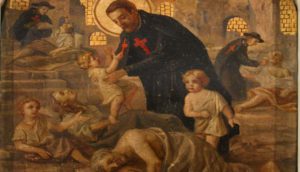 But it was a most just thing that the ‘Ministers of the Sick’ also won on the field of their labours the palm of martyrdom in self-sacrifice, providing care to their sick neighbours. By divine testimony: ‘there is no greater love – in fact – than this, laying down one’s own life for the health of our brethren’. The fourth solemn vow by which the Sons of St. Camillus pledge themselves to care for the sick, even the plague-stricken, has asked and continually asks for victims so as to crown them with glory. To die, or even only to expose oneself to the risk of dying, by caring for the plague-stricken is – St. Charles Borromeo argued – to be martyrs. And we have, I would say, almost official proof of this in the Church which on 26 February in the Roman roll of martyrs indicates that in Alexandria in Egypt there is a memorial on that day of those many saints – priests and deacons – who between 249 and 262 died caring for the plague-stricken, thereby receiving the honour from Christians of the glorious title of martyrs.
But it was a most just thing that the ‘Ministers of the Sick’ also won on the field of their labours the palm of martyrdom in self-sacrifice, providing care to their sick neighbours. By divine testimony: ‘there is no greater love – in fact – than this, laying down one’s own life for the health of our brethren’. The fourth solemn vow by which the Sons of St. Camillus pledge themselves to care for the sick, even the plague-stricken, has asked and continually asks for victims so as to crown them with glory. To die, or even only to expose oneself to the risk of dying, by caring for the plague-stricken is – St. Charles Borromeo argued – to be martyrs. And we have, I would say, almost official proof of this in the Church which on 26 February in the Roman roll of martyrs indicates that in Alexandria in Egypt there is a memorial on that day of those many saints – priests and deacons – who between 249 and 262 died caring for the plague-stricken, thereby receiving the honour from Christians of the glorious title of martyrs.
TAIWAN
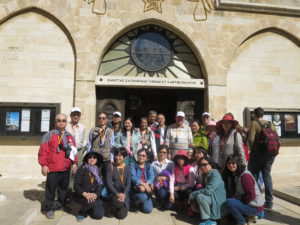


On Sunday 16 April the Easter of the Resurrection was celebrated in the church dedicated to St. Camillus in Lotung. Fr. Angelo Brusco was also present at the liturgy. During the period of Easter he was a guest of the Camillian community, to which he ‘preached’ the spiritual exercises. Amongst those taking part there was also Fr. Ivo Anselmi of the Philippines.
On 23-26 April a series of papers was given on the various Camillian institutions of Taiwan (the centre in Taipei, the college for nurses, the centre for handicapped people, and the two hospitals) on the subject: humanisation in service to the sick.
THE MEETING OF CAMILLIAN PARISH PRIESTS AND RECTORS
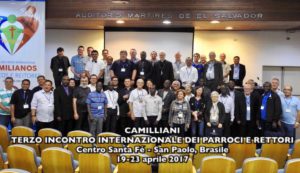


Moments of analysis and the sharing of views on the identity of a parish with a ‘Camillian’ profile followed one another: the Camillian parish as an ‘open hospital’, knowing, loving and serving above all the poorest sick people, between kononia (a setting of communion), kerigma (proclaiming the Word of salvation), and diakonia (mission and the service of charity).
The goal of the meeting was to draw up guidelines – STATUTES – that could accompany the mission of those Camillians to whom is entrusted responsibility for the pastoral care of a parish, so that, in continuing to live fully the Camillian charism, they help to form ‘Camillian’ Christian communities, being sensitive to people who suffer and to their members who are most in need. The activities engaged in by Camillian religious must have their specificity because – as Pope Francis says – a shepherd must give off the ‘smell’ of his sheep, but the sheep must also breathe in the ‘smell’ of their shepherd.
Here are the reports on the first, second and third days of the meeting.
The ‘Camillian’ Parish: an Open Hospital and a House of Hope and Mercy.
STATUTE OF THE PARISHES AND RECTORIES ENTRUSTED TO THE CAMILLIANS
The religious assigned in the parishes and rectories entrusted to the Camillians, who have met in S. Paulo of Brazil from April 19-23, 2017, offer a common framework for the development, promotion and harmonization of this ministry entrusted to them with particular attention to draw out a missionary and Camillian physiognomy having in their hearts the charism of the Order of “reliving the ever-present merciful love of Christ for the sick” (Const. 1) which “is expressed and realized in our ministry, in the world of health, illness and suffering”. (Const. 10).
In a particular manner, the Provinces, Vice-Provinces and Delegations of the Order are called to respond to “the more urgent needs of the Church and the neighbor”, with openness “to other forms of ministry, especially on behalf of those in need”. (Const. 10 ).
The clear goal of the participants during this meeting in Sao Paolo was to identify appropriate guidelines for the parishes and rectories in order to realize, in addition to the healthcare facilities, the necessity of responding to our classical ministry of home care assistance (mare magnum) and to the appeal of Pope Francis to build “field hospitals”.
The Camillian parish carries out its ministry in full harmony with the universal and the local church. In visits to the sick in health facilities, in silently being with the sick person, kind treatment, sensitive care for the requirements of the disease, the motherhood of the church is expressed through the professionals and volunteers, disciples of the Lord. The church enfolds them with its kindness, strengthens the heart, and for the dying, accompanies them in the final passage. The sick person lovingly receives the Word, forgiveness, the sacrament of Anointing, and gestures of charity from brothers and sisters. (Document of Aparecida, 420).
BEING A CAMILLIAN AND A SAMARITAN TODAY
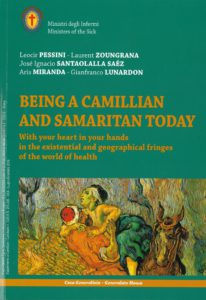


The messages, reflections and recommendations of the Superior General and the members of the General Consulta have been brought together in a single volume and arranged in chronological order according to the dates of these visits. These messages have already been published in the review Camilliani/Camillians and were addressed first and foremost to the about 1,070 Camillian religious who live in almost 300 communities in 41 countries of the world.
In this way, the duty laid down in the General Statutes of the Order about pastoral visits and visitators was complied with: ‘The visitator listens to all the religious, individually. In this personal interview, he endeavours to ascertain whether, within the community, there exists the common life, the spirit of fraternal charity, and the commitment to our Order, for the purpose of promoting the religious and apostolic life’ (GS, 110); ‘After mature reflection, the visitator gives a report of the recommendations he considers opportune. With exactness, he informs the general consulta of the visitation, and transmits the relative documents to it. He should avoid exceeding the limits of his ordinary or delegated authority’ (GS, 111).
This preface is organised into four parts: the Camillian project for the revitalisation of our consecrated lives and the current ecclesial context; the meetings with our religious in the geographical and existential fringes of the Order; the structure and contents of this book and its objectives; and some statistical data on the journeys and pastoral visits that were engaged in.
THE DELEGATION OF VIETNAM
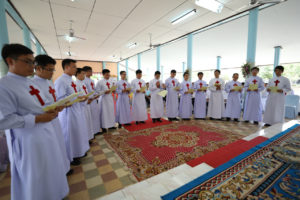


THE PROVINCE OF SICILY AND NAPLES
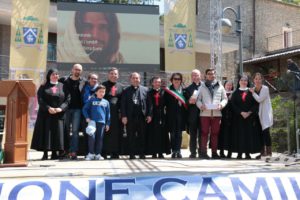


MANFREDONIA – VALLE DELL’INFERNO
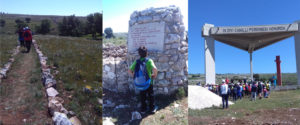


THE LAY CAMILLIAN FAMILY
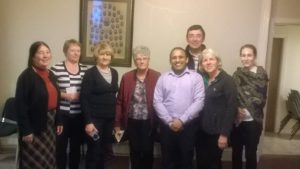


THE PROVINCE OF NORTH ITALY
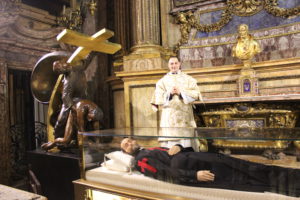


Download here the invitation and the poster
BOLOGNA



Read here the article from Avvenire
THE APPOINTMENT OF PROVINCIAL AND VICE PROVINCIAL COUNCILORS – 2017/2020
Leocir Pessini, the Superior General, with the agreement of the members of the General Consulta, after consulting the religious of the Provinces and Vice-Provinces of the Order, on 17-18 May 2017, appointed (Cost. 109), for the three-year period 2017-2020, the following Provincial Councilors.
Province of Poland
fr. Arkadiusz Novak – I° Consigliere
fr. Ireneus Sajewicz
fr. Wojciech Weglicki
br. Bronislaw Malicki
Province of Thailand
fr. Thaisonthi Chaisak – I° Consigliere
fr. Sengcharoen Phakhawi
br. Suchiranutham Chirawat Nicolas
fr. Contarin Giovanni
Province of the Philippines
fr. Rodel Enriquez – I° Consigliere
fr. Gabriel Garcia
fr. Rodolfo Cancino
fr. Renato Maliwat
Province of India
fr. Pattathil Lijo, Mathew – I° Consigliere
fr. Kuliraniyil Bijoy, Joseph
fr. Narikuzhy Jaison, Emmanuel
fr. Kizhakkarakkatt Biju, Peter
Province of North Italy
fr. Giuseppe Rigamonti – I° Consigliere
fr. Joaquim Paulo Cipriano
fr. Umberto Andreetto
fr. Edoardo Gavotti
Province of Rome
fr. Agasantis Mario – I° Consigliere
fr. Blasi Emilio
fr. Palumbo Sergio
fr. Santone Germano
Province of Sicily and Naples
br. Carlo Mangione – I° Consigliere
fr. Luigi Maglione
br. Leonardo Grasso
fr. Medard Aboué
Province of Brazil
fr. Mario Luis Kozik – I° Consigliere
fr. Mateus Locatelli
fr. Olacir Geraldo Agnolin
fr. Francisco Gomes da Silva
Vice-Province of Benin-Togo
fr. Hounliho Magloire – I° Consigliere
fr. Allognon Valentin
br. Agbeka Olivier
br. Akoue Antoine
Vice-Province of Perù
fr. Scapin Camillo – I° Consigliere
fr. Ballena Rios Alex Spencer
fr. Herrera Tapia Ever
fr. Angeles Cervantes Antonio Omar
Province of Spain
fr. Jesús María Zurbano – I° Consigliere
fr. Juan Antonio Amado
fr. Luis Armando De Jesús Leite Dos Santos
Province of Austria
fr. Kovács Levente – I° Consigliere
fr. Gregotsch Leonhard
fr. Gruber Stefan (consigliere sostituto a norma di DG 103)
Province of France
fr. Alexandre Balma – I° Consigliere
br. Michel Mathieu
fr. Bernard Moegle (consigliere sostituto a norma di DG 103)
Province of Germany
p. Paul Schreur – I° Consigliere
p. Arno Geiger
p. Norbert Riebartsch
p. Manuel Tamayo
Province of Burkina Faso
fr. Francois Edgar YAMEOGO – I° Consigliere
fr.Wendbenedo Justin Barnabe BERE
fr.Albert Theophane YONLI
fr.Georges NABOLE
THE APPOINTMENT OF DELEGATE GENERAL FOR THE ANGLO-IRISH PROVINCE – 2017/2020



“May mercy guide our steps, inspire our reforms and enlighten our decisions. May it be the basis of all our efforts. May it teach us when to move forward and when to step back. May it also enable us to understand the littleness of all that we do in God’s greater plan of salvation and his majestic and mysterious working”.
Pope Francis, Presentation of the Christmas Greetings to the Roman Curia (21december 2015)
THE DIARY OF THE SUPERIOR GENERAL
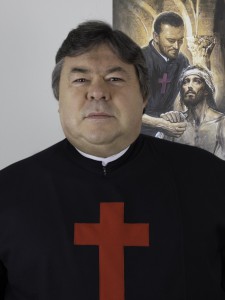



On 10 May 2017, in Bologna, Fr. Leocir Pessini, the Superior General, took part in the nineteenth national conference of directors of diocesan offices for pastoral care and for associations concerned with such pastoral care and people who provide it. This conference had been organised by the Italian Bishops’ Conference (CEI). The subject of the conference was ‘Proclaiming and Caring for the Sick: which Prophecy for Pastoral Care in Health?’
Read here the article by Agensir
‘Vocational Discernment in an Intercultural World’ is the subject of the eighty-ninth six-monthly assembly of the Union of Superior Generals (USG) which will be held in 24-26 May of this year in Rome at the Salesianum. This subject ‘is closely bound up with that of the next Synod of Bishops’. On Wednesday 24 May Fr. Arturo Sosa, the Superior General of the Society of Jesus, will give a paper on ‘Consecrated Life in an Intercultural World Today’. The next day Fr. Mark Weber, the Secretary for Formation of the Society of the Divine Word, will give a paper on ‘Vocational Discernment in an Intercultural World: an Overall Vision’. The second part of the subject will be addressed by three Superior generals from Africa, Asia and Latin America who will narrate the experiences of their Institutes. Fr. Leocir Pessini will be one of these.
Cf.Programme
MEETING OF THE MAJOR SUPERIORS
This meeting – a short course of formation – of the Major Superiors of the Order in Rome, at the generalate house of the Brothers of Christian Schools (Rome), will be held on 24 June to 2 July 2017.
DECISIONS OF THE GENERAL CONSULTA
GUIDELINES OF INTERPROVINCIAL COLLABORATION
The exchange of religious between different Provinces has by now become a phenomenon that involves all the Provinces of our Order. The direction, above all, is from the ‘youngest’ and most numerous Camillian entities to those which are more ‘elderly’ and lacking in religious. These new and absolutely unprecedented – as regards our recent history as well – equilibriums within the geography of the Order of Camillians can no longer be reduced to mere episodes or temporary support for a Province that is in difficulty.
Starting with this general observation, we believe that it is necessary to define guidelines that can accompany and assure the transparency of institutional and fraternal relationships in this exchange of religious who live in a Camillian entity that is different to the one they come from.
The Constitution of the Order, at n. 58, reads: ‘Thus, we promote, within the Order, community reflection, discernment, cooperation among the confreres, the communities and the Provinces’. This approach finds its concrete application in the Camillian Project which invites us ‘to set in motion processes of restructuring and inter-Provincial cooperation’ and subsequently specifies a whole series of initiatives that are to be promoted with a view to achieving effective cooperation between Provinces (cf. Camillian Project 3.4.): ‘The point of departure for every kind of cooperation, above all of an international character, is a solid formation in welcome which creates fraternity. To this end, meetings at every level are needed between religious – and between religious and lay people – on the subjects of evangelisation in multi-ethnic contexts and contexts where religious pluralism prevails; on inculturation and the capacity for integration; on the exchange of life experiences…
Any exchange of confreres between the various continents…must be based upon a shared project of activities and initiatives that respond to the problems that are most urgent from a charismatic point of view, assuring a continuity of commitment to witness through spirituality and fraternity, offering, at the same time, specific opportunities for formation…
The maximisation of human and economic resources must privilege a global outlook on the Order and cannot be determined by the interests of individual Provinces or mere agreements between Provinces: constant connection is needed with the mediation that is offered by the planning of the central government of the Order’.
So that these inter-relationships of religious from different Provinces can be really a source of renewed impetus and fruitful growth at a personal, community, and ministerial level, we here propose some basic criteria that should be respected.
Read here: Relationships with Religious from other Provinces
DECEASED RELIGIOUS
‘See, now they vanish, the faces and places, with the self which, as it could, loved them. To become renewed, transfigured, in another pattern’ (T.S. Eliot).






During the years of his formation, the young cleric Baggio stood out for the sincerity of his character, the simplicity of his style of life, and his passion in applying himself to his studies, in reading, and in historical research – aptitudes that would accompany him on his journey throughout his life.
His theology studies took him to Mottinello di Rossano Veneto (VI) where he was ordained a deacon (17.12.1955) and a presbyter (17.06.1956) by the Bishop of Padua, Msgr. Girolamo Bortignon. On the little picture that records this event, Father Lino, a newly-ordained priest, expressed his great esteem for the dignity to which the Lord had called him, entrusting it to the words of St. Augustine: ‘O priest! Who are you? It is not you because you are the servant of everyone. It is not you because you are of God’. READ HERE
‘Now they live in Christ whom they met in the Church, followed in our vocation, and served in the sick and the suffering. Trusting that the Lord, the Holy Virgin our Queen, St. Camillus, the Blessed Luigi Tezza, the Blessed Giuseppina Vannini, and our deceased religious brothers and sisters, will welcome them in their midst, we commend them in our prayers, remembering them with affection, esteem and gratitude’.



